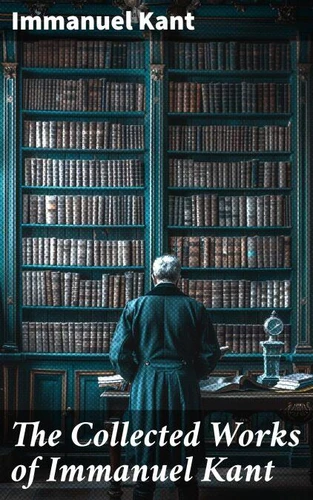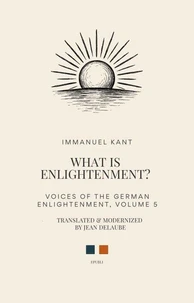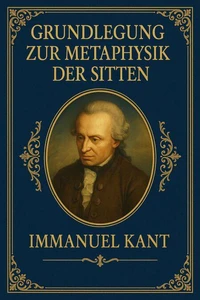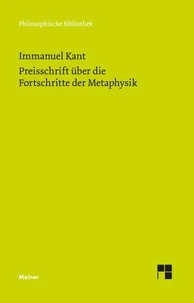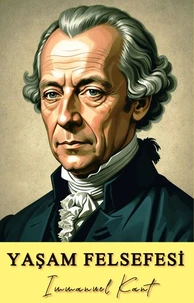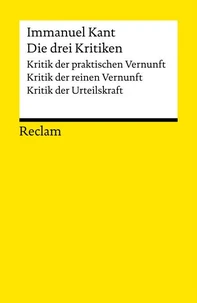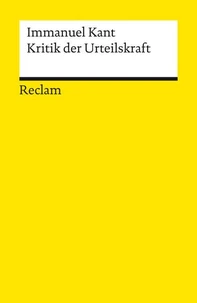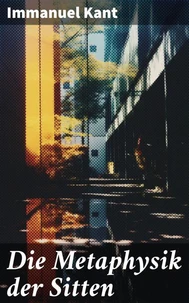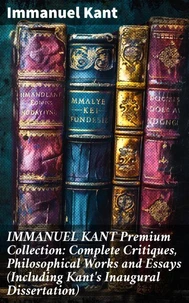The Collected Works of Immanuel Kant. Exploring Reality, Morality, & Knowledge: A Deep Dive into Kantian Philosophy
Par : , , ,Formats :
Disponible dans votre compte client Decitre ou Furet du Nord dès validation de votre commande. Le format ePub est :
- Compatible avec une lecture sur My Vivlio (smartphone, tablette, ordinateur)
- Compatible avec une lecture sur liseuses Vivlio
- Pour les liseuses autres que Vivlio, vous devez utiliser le logiciel Adobe Digital Edition. Non compatible avec la lecture sur les liseuses Kindle, Remarkable et Sony
 , qui est-ce ?
, qui est-ce ?Notre partenaire de plateforme de lecture numérique où vous retrouverez l'ensemble de vos ebooks gratuitement
Pour en savoir plus sur nos ebooks, consultez notre aide en ligne ici
- Nombre de pages820
- FormatePub
- ISBN859-65--4779343-4
- EAN8596547793434
- Date de parution29/12/2023
- Protection num.Digital Watermarking
- Taille2 Mo
- Infos supplémentairesepub
- ÉditeurGOOD PRESS
Résumé
The Collected Works of Immanuel Kant presents a definitive compendium of the pivotal writings of one of the foremost thinkers of the Enlightenment. This extensive anthology encapsulates Kant's revolutionary ideas on metaphysics, epistemology, ethics, and aesthetics, notably from key texts such as "Critique of Pure Reason" and "Groundwork for the Metaphysics of Morals." The literary style oscillates between rigorous philosophical discourse and accessible prose, showcasing Kant's methodical approach to inquiry and his ambition to reconcile empirical reality with rational abstraction.
Contextually, these works mark a significant paradigm shift, positioning Kant as a central figure in the transition from rationalism to idealism, influencing a myriad of philosophical traditions that followed. Immanuel Kant (1724-1804) was a German philosopher whose intellectual journey was deeply rooted in the scientific and philosophical currents of his time, including the work of Leibniz and Hume.
His formative years experienced the blossoming of the Enlightenment, which challenged established doctrines and emphasized reason as a guide for human understanding. This milieu undoubtedly shaped Kant'Äôs exploration of the limits of human knowledge and the moral implications of autonomy, leading to his profound existential inquiries. I highly recommend The Collected Works of Immanuel Kant to anyone keen to engage with foundational philosophical ideas that continue to resonate in contemporary discourse.
This anthology not only serves as a vital reference for scholars and students alike but also invites general readers to grapple with profound questions regarding human nature, knowledge, and morality.
Contextually, these works mark a significant paradigm shift, positioning Kant as a central figure in the transition from rationalism to idealism, influencing a myriad of philosophical traditions that followed. Immanuel Kant (1724-1804) was a German philosopher whose intellectual journey was deeply rooted in the scientific and philosophical currents of his time, including the work of Leibniz and Hume.
His formative years experienced the blossoming of the Enlightenment, which challenged established doctrines and emphasized reason as a guide for human understanding. This milieu undoubtedly shaped Kant'Äôs exploration of the limits of human knowledge and the moral implications of autonomy, leading to his profound existential inquiries. I highly recommend The Collected Works of Immanuel Kant to anyone keen to engage with foundational philosophical ideas that continue to resonate in contemporary discourse.
This anthology not only serves as a vital reference for scholars and students alike but also invites general readers to grapple with profound questions regarding human nature, knowledge, and morality.
The Collected Works of Immanuel Kant presents a definitive compendium of the pivotal writings of one of the foremost thinkers of the Enlightenment. This extensive anthology encapsulates Kant's revolutionary ideas on metaphysics, epistemology, ethics, and aesthetics, notably from key texts such as "Critique of Pure Reason" and "Groundwork for the Metaphysics of Morals." The literary style oscillates between rigorous philosophical discourse and accessible prose, showcasing Kant's methodical approach to inquiry and his ambition to reconcile empirical reality with rational abstraction.
Contextually, these works mark a significant paradigm shift, positioning Kant as a central figure in the transition from rationalism to idealism, influencing a myriad of philosophical traditions that followed. Immanuel Kant (1724-1804) was a German philosopher whose intellectual journey was deeply rooted in the scientific and philosophical currents of his time, including the work of Leibniz and Hume.
His formative years experienced the blossoming of the Enlightenment, which challenged established doctrines and emphasized reason as a guide for human understanding. This milieu undoubtedly shaped Kant'Äôs exploration of the limits of human knowledge and the moral implications of autonomy, leading to his profound existential inquiries. I highly recommend The Collected Works of Immanuel Kant to anyone keen to engage with foundational philosophical ideas that continue to resonate in contemporary discourse.
This anthology not only serves as a vital reference for scholars and students alike but also invites general readers to grapple with profound questions regarding human nature, knowledge, and morality.
Contextually, these works mark a significant paradigm shift, positioning Kant as a central figure in the transition from rationalism to idealism, influencing a myriad of philosophical traditions that followed. Immanuel Kant (1724-1804) was a German philosopher whose intellectual journey was deeply rooted in the scientific and philosophical currents of his time, including the work of Leibniz and Hume.
His formative years experienced the blossoming of the Enlightenment, which challenged established doctrines and emphasized reason as a guide for human understanding. This milieu undoubtedly shaped Kant'Äôs exploration of the limits of human knowledge and the moral implications of autonomy, leading to his profound existential inquiries. I highly recommend The Collected Works of Immanuel Kant to anyone keen to engage with foundational philosophical ideas that continue to resonate in contemporary discourse.
This anthology not only serves as a vital reference for scholars and students alike but also invites general readers to grapple with profound questions regarding human nature, knowledge, and morality.

